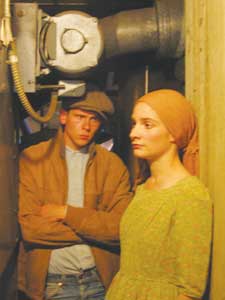![[Metroactive Stage]](/stage/gifs/stage468.gif)
[ Stage Index | Santa Cruz Week | SantaCruz Home | Archives ]
Program Notes
'Hard Times' delivers a skillfully bleak view of the Industrial Revolution
By Sarah Phelan
Sometimes the most useful thing you can have in your hands on the opening night of a theatrical production is the program, which typically contains the cast of characters, and if you're really lucky, a plot summary, plus the director's notes.
Such was the case at Ghostlight Theatre's adaptation of Hard Times, which was Charles Dickens 10th novel. First published as an unillustrated weekly serial, Hard Times delivers an unrelentingly grim sketch of the industrialization, education and utilitarianism that swept England in the 1850s--a scene of such despairing bleakness that escapism-seeking theatergoers could be forgiven for wondering why this, why now? The answer lies in the program notes, which explain the choice thusly:
"As the world is going through the birth pains of a new millennium, and seems hell-bent on re-experiencing the worst excesses of the Industrial Revolution, we, the company members of Ghostlight Theatre, have turned our attention towards Charles Dickens' heated probing of the original event and found his words to be as vigorous and as apt as when they were first committed to paper. ... We have been moved by the lives of the characters in this book, because we recognize that they are also the lives being led by the vast underpaid, under-stimulated multitudes that are putting the clothes upon our backs."
(These are words that make you glad you decided not to wear that "Made in Burma" T-shirt after all, even if it was the only clean thing in your closet.)
That said, you're left wondering how Ghostlight Theatre will transcend the fact that Hard Times is stripped of Dickens' usual humor, rich characterization and subplot, which was one reason the original novel was characterized as "sullen socialism" when it first came out.
The answer to the worthy-isssue-but-depressive-material dilemma lies in director Bill Peters' inventive use of music, props and lighting, and his direction of the cast, two of whom play male and female characters throughout the course of the evening.
Peters himself plays Mr. Bounderby, the affluent and merciless mill owner, who derides the poor for their alleged desire "to be fed turtle soup and venison with a gold spoon."
Mark Bradlyn and Kira Wehe-Moody are credible as Stephen and Rachel, the doomed lovers. Sarah Albertson is solid as Thomas "Stick to the facts!" Gradgrind, and Misti Boettiger is convincing as the daughter Gradgrind sacrifices in marriage. Cecilia Palmtag shines in her dual roles as Cecelia and Harthouse, and Sam Richie pulls off an opportunistic Tom. A special mention goes to Martha Rabin for her baked-potato-and-lamb-chop scene as Mrs. Sparsit--a hilarious moment in an otherwise serious evening that will appeal to those who believe in the message of the old labor song (also printed in the program) that goes: "If we all join together, we can turn it around."
Copyright © 2005 Metro Publishing Inc. Maintained by Boulevards New Media.
For more information about Santa Cruz, visit santacruz.com.
![]()

Bleak House: Samuel Richie and Cecelia Palmtag model Industrial Revolution fashions in 'Hard Times.'
Hard Times. Actors' Theatre, 1001 Center St., Santa Cruz, through
June 26. 8pm, Thu�Sat, 3pm, Sun. $15/general, $12/seniors and students; Thursdays are two-for-one. Call 831.425-PLAY. Tickets also available at the Civic Auditorium Box Office at 307 Church St.
From the June 22-29, 2005 issue of Metro Santa Cruz.